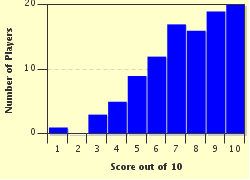Quiz Answer Key and Fun Facts
1. The first recorded English settlers to the United States arrived in the 1600s. Which future Southern state (after failed attempts) was the site of the first English settlement?
2. Before the first successful European settlement, there were a number of failed settlements near it, most notably the lost colony of Roanoke. Under which European monarch was the colony founded (and eventually lost)?
3. Initially, the first settlers came to Jamestown in 1607 for gold. However, in a period known as "the starving time", nearly 80% of the original settlers died. What crop contributed to the comeback of the settlement in the 1610s?
4. Before the 1660s, indentured servants from England were sent to Jamestown to assist in cultivating tobacco. In return for being provided accommodations to Jamestown, they worked cultivating tobacco for life.
5. The settlement of Jamestown can also be noted for having another first: the first form of self-government in what would be the British colonies. This place of government was called the House of what?
6. Speaking of self-government, another example of colonial self-government was the Mayflower Compact. It was signed by soon-to-be settlers in what would be which Northern state?
7. The Plymouth colony was founded in 1620 by the original passengers of the Mayflower. The settlers were known as "Separatists", but what were they separating from?
8. Plymouth was self-sustaining (with help from Native Americans) until 1691. What was the eventual fate of the Plymouth colony?
9. Historians note the populace of the Massachusetts Bay Colony as strongly Puritanical. In fact, religious restrictions severely impacted the eventual electorate (i.e. those who are able to vote). Some people, in particular, were elected and re-elected multiple times by this electorate. Which of these was one of them?
10. Another side effect of the Puritanical effect of the Massachusetts Bay Colony was that a number of influential people were banished from the colony. From the following, who was NOT expelled from the colony?
Source: Author
omar7812
This quiz was reviewed by FunTrivia editor
bloomsby before going online.
Any errors found in FunTrivia content are routinely corrected through our feedback system.


